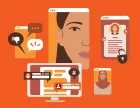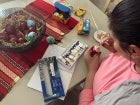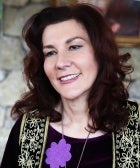Breadcrumb
Stories
Topic
- Show all (1276)
- Sexual harassment (-) (24)
- Civil society (-) (12)
- Public sector reform (-) (1)
- Ending violence against women and girls (72)
- Gender equality and women’s empowerment (45)
- Anti-violence interventions (41)
- Gender discrimination (38)
- Gender equality and inequality (38)
- Domestic violence/interpersonal violence (36)
- Access to justice and legal protection (33)
- Legal assistance (29)
- Laws, legislation (26)
- Gender-responsive budgeting (24)
- Primary prevention (24)
- Feminicide/femicide (23)
- Service delivery (23)
- Economic empowerment (22)
- Rape/sexual assault (21)
- Employment (20)
- Shelters (20)
- Rural women (19)
- Entrepreneurship (18)
- Decision-making (16)
- Youth (16)
- Gender power relations (15)
- Women’s rights (15)
- COVID-19 (14)
- Financing for gender equality (13)
- Gender mainstreaming (13)
- Gender, culture and society (12)
- Men and boys (masculinity) (12)
- Political empowerment (12)
- Access to basic services (11)
- Adolescents (11)
- Businesses and foundations (11)
- Girls (11)
- Human rights (11)
- UNiTE campaign (11)
- Beijing Platform for Action (10)
- Civil society participation (10)
- Peace and security (10)
- Safe Cities and Safe Public Spaces (10)
- Training (10)
- Women with disabilities (10)
- Convention on the Elimination of All Forms of Discrimination against Women (CEDAW) (9)
- Financial resources (9)
- Information and communications technology (ICT) (9)
- Leadership and political participation (9)
- National planning (9)
- Partnerships (9)
- Gender stereotypes (8)
- Governance (8)
- Innovation and technology (8)
- Institutional mechanisms (8)
- Peacebuilding (8)
- Social protection (8)
- Women farmers (8)
- Citizen engagement (7)
- Gender statistics (7)
- Generation Equality (7)
- Government contributors (7)
- Productive resources (7)
- Religion (7)
- Science and technology for development (7)
- Sports (7)
- Trafficking/sexual exploitation (7)
- Women’s movements (7)
- 2030 Agenda for Sustainable Development (6)
- Child marriage (6)
- Communications and media (6)
- Electoral systems and processes (6)
- Lesbian, gay, bisexual, transgender, intersex (LGBT) rights (6)
- Markets (6)
- Political violence (6)
- Sex-disaggregated data (6)
- Sustainable Development Goals (SDGs) (6)
- Unpaid work (6)
- Accountability (5)
- Gender data production and collection (5)
- Governance and national planning (5)
- Rural development (5)
- Traditional media (5)
- Constitutions and legal reform (4)
- Gender data gaps (4)
- Gender data use and accessibility (4)
- Gender wage gap (4)
- Health (4)
- Intergovernmental processes (4)
- Land and property (4)
- New media (4)
- Poverty (4)
- Public administration (4)
- Rule of law (4)
- Schooling (4)
- Accountability in the UN system (3)
- Climate change (3)
- Crisis response and recovery (3)
- Education (3)
- Environmental protection (3)
- Gender equality indicators (3)
- Health care services (3)
- Inheritance rights (3)
- Living conditions (3)
- Media leadership (3)
- National mechanisms (3)
- National statistical systems (3)
- Parliamentary development (3)
- UN Security Council resolution 1325 (3)
- UN system coordination (3)
- Capacity development (2)
- Coordination, knowledge management (2)
- Disaster risk reduction (2)
- Food security (2)
- Fundamental freedoms (2)
- Fund for Gender Equality (2)
- Harmful practices (2)
- Humanitarian action (2)
- Human rights–based approach (2)
- Macroeconomic policies (2)
- Monitoring and evaluation (2)
- Planning and monitoring (2)
- Sexual and reproductive health and rights (2)
- UN Security Council resolutions (2)
- Urban development (2)
- Åsa Regnér, Deputy Executive Director for Policy, Programme, Civil Society and Intergovernmental Support (1)
- Children’s rights (1)
- Commission on the Status of Women (1)
- Executive Director (1)
- Financial and economic crisis (1)
- Green economy (1)
- Literacy (1)
- Local development (1)
- Maternal health (1)
- Migration (1)
- Monitoring, evaluation and reporting (1)
- Peace processes (1)
- Sexuality (1)
- Temporary special measures, affirmative action (1)
- UN Trust Fund to End Violence against Women (1)
Region
Country
1 - 20 of 35 Results
Pagination
Date:
Albania recently hosted its inaugural Gender Datathon, uniting students, researchers, and activists to explore data's role in advancing gender equality. Dive into this groundbreaking event and learn how data literacy can empower advocates for change!
Date:
This innovative methodology, introduced by ESD Albania with the support of UN Women and funding from the Swedish Government, aims to prevent violence and reduce bullying in schools. This is the story of a dedicated teacher and her students at “Karl Gega” High School in an Albanian village, and how ESD has transformed their lives.
Date:
Forty one percent of Albanian women active online have experienced some form of technology-facilitated violence in their lifetime – the new research “The Dark Side of Digitalization: Technology-Facilitated Violence Against Women in Eastern Europe and Central Asia” shows.
Date:
They are asking for increased long-term, sustainable investments from government, private sector, foundations, and other donors to prevent violence against women and girls.
Date:
In a dedicated effort to promote gender equality and eliminate all forms of discrimination against women, Albania is preparing for its fifth report to the Committee on the Elimination of All Forms of Discrimination Against Women (CEDAW), scheduled for October 18, 2023.
Date:
A two-day workshop on gender participatory budgeting and community outreach practices brought together civil society organizations, local government representatives, activists, and gender-responsive budgeting experts from Albania and North Macedonia.
Date:
After six years of dedicated work, the UN Women regional programme Ending Violence Against Women and Girls in the Western Balkans and Turkyie “Implementing Norms, Changing Minds” comes to a close. Civil society organizations, government representatives and partners met to take stock of achievements, challenges, and the way forward.
Date:
In the last two years, thanks to support from the European Union-funded regional programme on ending violence against women “Implementing Norms, Changing Minds,” more than 3,000 women survivors have used the helpline for information, referrals and reporting – 900 of whom further obtained free legal aid and psychosocial counselling as well as referrals to more specialized support services.
Date:
Supported by a small grant from the UN Trust Fund, the Center "Shelter Edlira Haxhiymeri", in close partnership with the Streha Center for LBT women survivors of domestic violence, runs a project to end violence against women and girls in four remote areas of Albania.
Date:
Gjeline Doda, from Lezha, northwest Albania, is one of the first educators in Albania certified as an Empowerment Self-Defense (ESD) instructor in 2021. Apart from teaching high school math, which she has been doing for almost 15 years, she is now working to empower and teach personal safety to a new generation by boosting students’ self-esteem and communications skills to prevent and mitigate the risk of violence.
Date:
Thirty experts including government officials from ministries of finances, national gender mechanisms, local government representatives and supreme audit institutions, together with UN Women officials from across the Western Balkans met in Tirana, Albania on 3-4 May to monitor the progress in the implementation of the project “Transformative Financing for Gender Equality towards more Transparent, Inclusive and Accountable Governance in the Western Balkans” In 2022.
Date:
Verie Tahiraj is a strong and determined woman, who has been supporting her family through economic hardship for years. When the opportunity to secure a source of income by becoming a part of the artisan value chain presented itself, she seized it without hesitation.
Date:
Women artisans engaged in the handicraft value chain and market now better equipped to earn higher incomes.
Date:
Aferdita Kote’s* old Nokia phone had only one contact: that of her husband of 10 years. He called her constantly to know her whereabouts. But she did not tell him when she got a new smartphone equipped with a mobile application (Bright Sky) to report violence.
Date:
Fabiola Laço Egro is the founder and leader of the “Today for the Future” Community Center as well as a member of National Council of Civil Society in Albania and the Monitoring Network against Gender-Based Violence. One of the most prominent civil society activists in Albania, Ms. Laço Egro shares her perspectives and lessons learned on building networks and alliances to advance the gender equality agenda.
Date:
The UN Women office in Albania teamed up with the government, civil society organizations, international partners, and other UN agencies operating in the country to mark this year's 16 Days of Activism against Gender-based Violence with a variety of public events, university lectures, trainings, social media campaigns and much more.
Date:
The Ministry of Health and Social Protection and UN Agencies in Albania launched the “16 Days of Activism against Gender-Based Violence” campaign supported by UN Women. The event brought together government and international partners, feminists, women’s rights activists, as well as many others who work every day to prevent and eliminate violence against women and girls.
Date:
The plans were adopted following broad-based and inclusive consultations with public and nonpublic institutions, the civil society, academia, youth, and private sector representatives. The entire process was technically supported by UN Women, as part of the Joint Programme “European Union for Gender Equality in Albania,” financed by the European Union through the Albania SDG Acceleration Fund.
Date:
As a result of continuous lobbying efforts, Empowerment through Self Defense has now become part of the first National Strategy for Youth and its Action Plan 2022-2029 which was approved in October of the current year. This innovative approach addresses gender equality by helping build healthy interpersonal relations and empowers girls and boys.
Date:
Afërdita Prroni, the Executive Director of the Human Rights in Democracy Center, a grassroot civil society organization involved in promoting and protecting human rights in Albania, has been working to strengthen the implementation of the domestic violence law under UN Joint Programme on “Ending Violence Against Women in Albania” and UN Women’s project “Gender sensitive post-earthquake recovery and reconstruction” funded by the Swedish Government.
1 - 20 of 35 Results

















